Okaaay. I’m finally back from a whirlwind book tour. I gave endless interviews (I can now answer questions in my sleep); was wined and dined—great ilish in Kolkata and awesome Chettinad food in Chennai—and even ended up on youtube. I met some likeable and interesting people, including crime writer Zac O’Yeah (in conversation with me at the Bangalore do) and blogger-cum-bestselling writer Amit Varma, author of the delightful My Friend Sancho—he was in conversation with me in Mumbai and had some nice things to say about my book. And yes (I can’t resist the temptation to blow my own trumpet!), others have said good things about The Englishman’s Cameo, too: Pradeep Sebastian, writing in BusinessWorld, for instance; and Vivek Tejuja on http://www.goodreads.com.
So, having done my bit of shameless self-promotion—and wound up at exactly the place I wanted this post to go—I’ll begin with this review. Like me, the Urdu poet Mirza Ghalib was a Dilliwala. Like me, he too was a writer (and before I have Ghalib fans leaping at my throat for daring to lump the two of us together: no, I do not compare myself to the man. He was pure genius. Not so with me). And like me, Ghalib loved to hear his writing being praised.
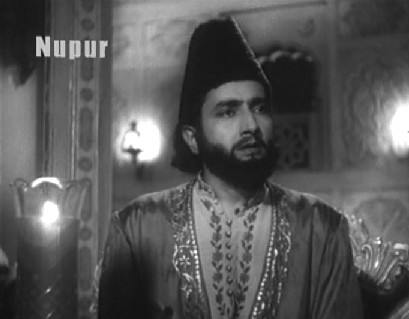
Which is where we come in. It’s a literary evening in mid-19th century Delhi, where the Mughal Emperor Bahadur Shah ‘Zafar’ (Iftekhar), himself a poet of considerable stature, is hosting a mushaira. [Aside: Iftekhar does full justice to his role as the doomed Emperor; I wish Bollywood had given this man more of these interesting roles rather than generally typecasting him as the cop].
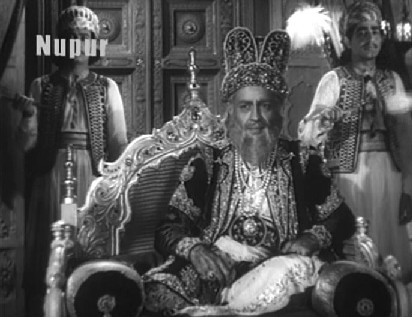
At the mushaira, the poetry of Zauq is much applauded; Mirza Asadullah Khan ‘Ghalib’, on the other hand, finds no takers for his ghazals. The general populace thinks his ghazals too profound and his Urdu too difficult. It seems, even in the more intellectual environment of the mushaira, nobody except the Mufti (Murad) and the Kotwal, Hashmat Khan (Ulhas) can find anything to appreciate in Ghalib’s poetry. The Mufti expresses his appreciation to Ghalib; the Kotwal spends his time hurriedly writing down the ghazal Ghalib has just recited.
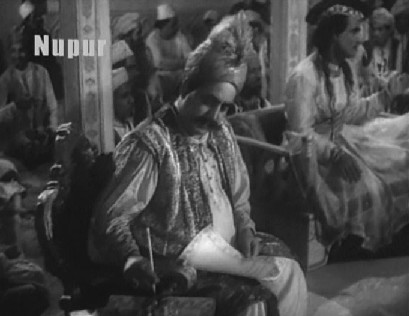
The Mufti’s praises are not enough for our poet. With an expression of disgust—he’s not going to be casting his pearls before swine such as this—Ghalib takes his leave of the Emperor and the assembly, and flounces out of the court. On his way home (in a sedan chair), he hears a woman singing one of his own ghazals. The singer is Moti Begum (Suraiya), daughter of a retired courtesan (Durga Khote). Moti’s mad about Ghalib’s poetry, and even about the man himself, even though she has no idea what her favourite poet looks like. (Ah, the formulas of Hindi cinema! Remember Chhaya? Remember Barsaat ki Raat?)
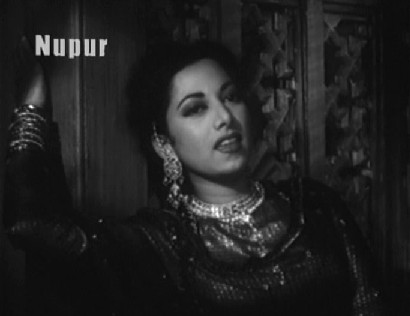
Ghalib, delighted that someone likes his poetry, knocks on Moti’s door and is admitted. Ghalib is awestruck not just by her enthusiasm for his ghazals but also by her beauty, and addresses her as Chaudhvin Begum (chaudhvin means ‘full moon’). When he realises she doesn’t know that he is Ghalib, he teases her by deprecating Ghalib’s poetry. Moti, of course, leaps to her hero’s defence and literally shoos the unexpected guest from her house.
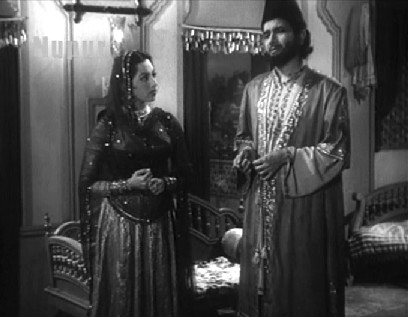
Right on Ghalib’s heels (in fact, bumping into the poet in the doorway) comes another visitor to Moti’s house: the Kotwal. He has just returned from the mushaira at the fort, bringing with him the transcript of the Ghalib ghazal he’d heard there. He hands over the ghazal to a grateful Moti, and astonishes her by identifying her recent guest as Ghalib himself.
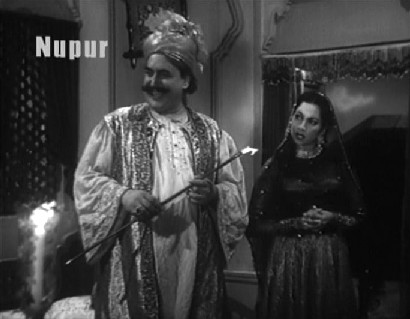
A few days later, Ghalib comes across yet another person singing one of his ghazals. This time, it’s a poor mendicant who, when questioned, tells Ghalib that Moti Begum teaches him these ghazals so that he can sing them to earn a few paisas. Ghalib, ego well fuelled, goes off to Moti Begum’s house once again, and is welcomed with much ecstatic gushing by the woman, who has now taken to calling herself Chaudhvin Begum. She is shy and demure; he is soulful.
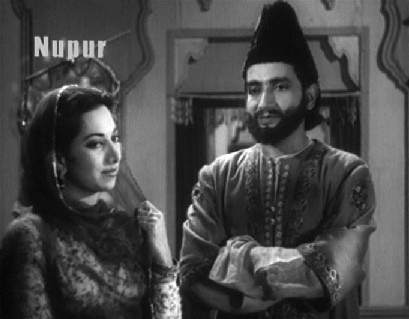
But Chaudhvin Begum is just one aspect of Ghalib’s somewhat troubled life. He may be a great poet, but that greatness isn’t enough to keep the wolves from the door. One somewhat benevolent wolf is the moneylender Mathuradas (Mukri) to whom Ghalib owes a large sum of money. Mathuradas comes by every now and then, asking for the debt to be cleared; but Ghalib always manages to fob him off.
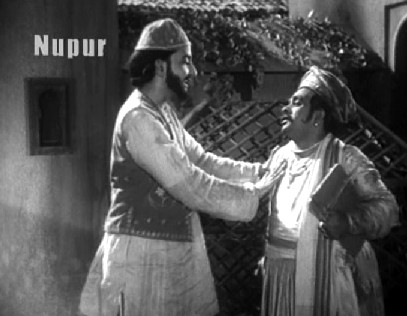
…and there is Ghalib’s wife (Nigar Sultana), an extremely religious woman who is tormented by the fact that none of her children have survived beyond infancy. Her relationship with her husband is one of easy camaraderie; she is his staunch supporter, a wife who never cribs that they’re forever in debt and who, even when she suspects that her husband is in love with another woman, does not protest or demand his love for herself. (Instead, she—in a fit of sati savitri behaviour that cheesed me off—tells him to marry a second time). This is an intriguing woman; she can be surprisingly progressive at times, irritatingly duh at others, and even, occasionally, appealing and wise.

Right now, however, the one facing hard times is Chaudhvin Begum. The Kotwal, Hashmat Khan, has been lusting after her and has persuaded Chaudhvin’s penurious mother to give her daughter in marriage to him. He has even paid a bride price of Rs 2,000—and Chaudhvin’s mother, despite all of Chaudhvin’s protests, insists that the wedding will take place.
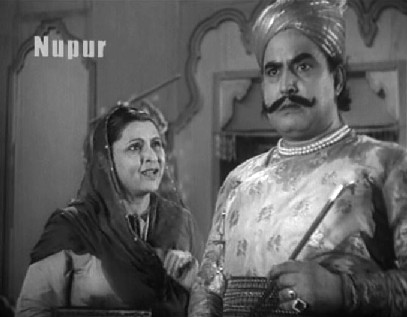
In desperation, Chaudhvin writes a letter to Ghalib and sends it to him through her doorkeeper-cum-general dogsbody, a man with a taste for liquor. The man sets out for Ghalib’s house on a Tuesday, wanders into a wine shop, and emerges on Thursday, leaving Ghalib very little time to devise any very effective plan to rescue Chaudhvin from this unwanted marriage. He decides to hand over Rs 2,000 to Chaudhvin’s mother; but since he doesn’t possess that much, he sets out to ‘earn’ it—by gambling. He’s successful, and hurries off to hand over the sum to the money-grubbing old woman.
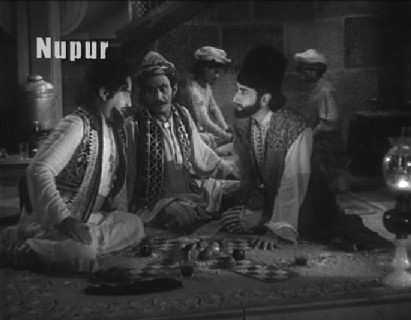
…Who has, in the meantime, become a changed person, all because a desperate Chaudhvin has tried to commit suicide. Suddenly overcome by a fit of maternal affection, Chaudhvin’s mother heaps recriminations on the head of the just-arrived Kotwal: he will not be married to Chaudhvin, not for all the gold in the world. Much arguing ensues, but the mother stands firm and the Kotwal is left fuming and vowing vengeance—mainly on Ghalib.
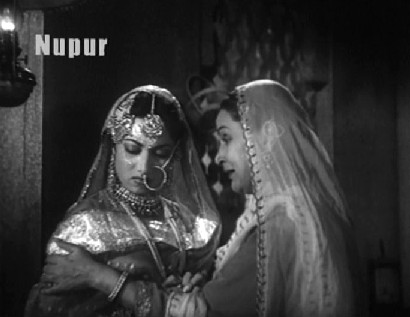
There is much to come, of course: the Kotwal’s attempts to have his revenge on Ghalib; Ghalib’s own growing love for Chaudhvin Begum, and his wife’s increasing frustration—on the one hand, jealous of Chaudhvin Begum; on the other, wishing for her husband’s happiness. And all of it played out against the background of a Delhi that’s changing, even the de jure power of its puppet emperor now ceded to the British Resident.
What I liked about this film:
The music. Oh, the music. If there is one reason to watch Mirza Ghalib, it’s the songs—written (of course!) by Ghalib (the ghazals are taken from the Dewan-e-Ghalib), and partly by Shakeel Badayuni, with music by Ghulam Mohammad. My favourites are Dil-e-naadaan tujhe hua kya hai and Aah ko chaahiye ek umr asar hone tak, but there are others too (Nuktacheen hai gham-e-dil, for example) that are hauntingly beautiful, both in terms of lyrics and music. And yes, Talat Mehmood and Suraiya sound absolutely sublime.
The occasional glimpses of an attempt at authenticity. As memsaab pointed out a while back, Sohrab Modi (who produced and directed Mirza Ghalib) paid a lot of attention to getting historical details right. There is, for instance, the scene where Ghalib emerges from the mushaira in the fort. I have no idea if Modi used a set or the real thing, but the Delhi Gate of the red Fort has a carved elephant exactly like the one shown onscreen!
What I didn’t like:
There is just something a little too unemotional and ambivalent about Mirza Ghalib’s character (or is Bharat Bhushan too wooden?). He’s witty in a dry and sarcastic sort of way—which is anyway reflected in a lot of Ghalib’s poetry—but he’s also bland and none too expressive. Whereas Moti/Chaudhvin is obviously madly in love with him, the same can’t be said of Ghalib. And even if you take into consideration that there are (later), definite signs of his passion for her, the route from mild interest to deep love is blurred and too sudden, more an infatuation than the true love it’s made out to be.
On the whole, there was something about this film that left me unsatisfied. The romance between the much-married Ghalib and Chaudhvin is unconvincing and consists mainly of singing mournful ghazals in each other’s memory; Ghalib’s wife, though an interesting character, seems unfinished, as if the writer had thought of giving her hidden depths, but decided midway not to; and Ghalib’s relationship with her is (to say the least) puzzling. And I’d have loved more of an insight into the political turmoil of Delhi on the brink of 1857—if for nothing more than to see more of Iftekhar as a convincing Bahadur Shah.
Mirza Ghalib, I think, needed much tighter scripting: it’s a simple story, with a fairly small cast, but not enough attention has been paid to developing the characters or their relationships.
Still, worth seeing for the songs—and, if you’re fond of antique ornaments (as I am!), Suraiya’s jewellery:
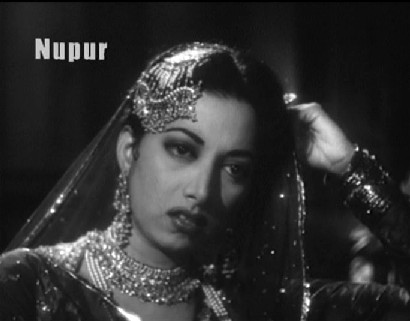
Little bit of trivia (spoilers ahead):
Interestingly enough, there are a number of incidents in the film that actually occurred in Mirza Ghalib’s life. He was, as shown in the mushaira, a rival of Zauq’s; his wife was a pious sort who stuck with him despite his philandering and the fact that he never had a steady income; and Bahadur Shah bestowed many honours on Ghalib, naming him Dabeer-ul-mulk, Najm-ud-Daulah, in effect the poet laureate of the Mughal court. What’s more (as shown in the latter half of the film), Ghalib was imprisoned for gambling.

Great to hear that you had a successful launching of your first book. I am hoping to get it from amazon uk by middle of December, and have pre ordered it.
I haven’t read the review of Mirza Ghalib, because I have this DVD and will watch it soon.
LikeLike
Pacifist, thank you! I do hope you enjoy Mirza Ghalib – though it’s not a brilliant film in terms of characterisation or even acting, it’s pleasant enough – and the songs are out of this world. Plus, of course, if you like Ghalib’s poetry: it’s a must-see.
LikeLike
I am re-watching this, am just 15 minutes into the movie. Love the ghazals, and the mushaira right at the beginning!
LikeLike
Yes, that mushaira at the beginning has some superb poetry – Ghalib’s, of course; but also Zafar’s and Zauq’s. Happy watching!
LikeLike
Thats great news! Your book is off to a great start (has already made it to a bestseller list!). And somebody’s already got a copy of it, while I have to wait till December! :-( Cant wait for my copy to arrive – I’ve pre-ordered too.
As to Ghalib Sahib, the name evokes memories of Gulzar’s TV series that starred Nasseeruddin Shah as the poet – not a favorite series and one that I purposely missed everytime! In my defence, I must say that I was a teenager then and had no appreciation for fine poetry. I still dont, but Talat Mahmood can convince me otherwise (Jagjeet Singh can NOT!), though even he cant convince me to watch the film! I am so glad you watched it and wrote it up – now I know about the film without having to see it.
LikeLike
I don’t know if Bharat Bhushan was a great actor or not but he was a star at that time.Like Ghalib, he too died in penury.I haven’t seen the film but hope to see it soon.
LikeLike
bollyviewer: You are too kind! :-) By the way, that person who got a copy of the book was D Murali, Deputy Editor of the Hindu Business Line newspaper – a copy was sent to him by Hachette, since he was the person in conversation with me at Chennai. A very witty man, easy to get along with (as well as being the one who did that video interview of me and uploaded all the answers on youtube).
Yep, I didn’t see much of the DD Mirza Ghalib either: I guess I was too young to appreciate good poetry at the time! And yes, I agree completely that Talat Mehmood is way better than Jagjit Singh – he and Suraiya make this film what it is with their songs. But since you can as well watch those on youtube, you’re better off not sitting through the entire film!
Nikhil: Somehow I’ve never been a fan of Bharat Bhushan’s – but I’ll concede this much: he acted in some films with superb music. This one, Baiju Bawra, Jahanara, Barsaat ki Raat… if for nothing else, his films are worth watching for their songs!
LikeLike
Agree re Bharat Bhushan, found him irritating, with nothing-will-ever-perturb-my-expression that he has on, but parents remember him fondly as a big star.
Whereas strangely, I did really like him Muzafar Ali’s Umrao Jaan, he could have done well in calm, wise older person roles.
Yes, they collected a lot of very good poets work for the Mushaira..and if you think muchaira’s are thing of the past, look at the crowds modern ones attract!
My own favourite is Anwar Masood (from who wields a mighty pen in both urdu and punjabi and farsi), often comic but always very very sharp! And he has such a wonderful reciting style
LikeLike
I remember watching live telecasts of mushairas on Doordarshan and PTV years ago – when much of the beauty of the poetry was lost on me! But shers from someone like Anwar Masood are always a joy to listen to – thanks for the clip; he’s such a delight!
Unfortunately, I don’t remember Bharat Bhushan in Umrao Jaan. I recall most of the other actors, but not him… must see it again. BTW, an unusual Bharat Bhushan starrer was a comedy called Mud-mud ke na Dekh, opposite Anita Guha. It was a fun film, very different from the usual BB fare. Also Prem Chopra’s first film.
LikeLike
Oh he was the Khan Sahib in Umrao Jaan, the one that was Rekha’s and Prema Narayan’s music teacher? That dance in the beginning, the classical one.
LikeLike
Great to have you back and i look forward to reading your book, read all the reviews and as i’ve said i wouldn’t be surprised if someone decides to masalify it. You do remind me a bit of Jordin Sparks
http://www.jordinsparks.com/
I have indeed seen Bharat Bhushan in both Baiju Bawra (he was very cute in this) and Barsaat ki raat and some of his later films where he was much more older, i think he might have been a bit wooden in his emotions but i find him watchable most times, at least i didn’t feel like flipping my remote at the TV whenever he was on
LikeLike
Welcome back! If this was a movie scene, you would be on the head of the staircase coming down slowly with all the people waiting downstairs and applauding your arrival. Everybody is dressed in 60s fashions and soon everybody will break into Hindi fillum style twist.
Mirza Ghalib brings back memories of Chayya Geet (DD and Vividh Bharati). I love the ghazal “dil-e-nadan” (sigh)! But somehow they never showed it on DD or if they did, I missed it.
I had expected, that the story would be somewhat more intense than this. But well, can’t help it. BB’s (Bharat Bhushan and Brigitte Bardot) films as you said have to be watched for their music!
The first wife forcing/persuading the husband to remarry for the sake of a child reminds me of the serial, which they showed in the late 80s or early 90s. In it Aruna Irani plays the first wife and since she can not bear a child she gets a new bride for her husband, who in turn also can not bear a child. All the time nobody wonders if maybe the husband is at fault. Anyway, I had to laugh at what Aruna Irani’s dialogue “Abhi mein iska kya aachar dalu?” Very tragic, but I’ve to laugh every time I remember it!
I would love to get my hands on Gulzar’s Mirza Ghalib. Will have to wait till I’m back in B’bay again.
@ Nikhil: No, I don’t think Bharat Bhushan died in penury. he just didn’t die rich. Since both he and his wife Ratna Bhushan regularly acted in serials and such, I think they had a steady income, but not enough to live in style and supposedly lots of money got diverted for booze. Others fared worse for e.g., Cuckoo.
I think what made up Bharat Bhushan’s charm was his love-lorn look. That is why I think he was often cast as a poet or a saint. Didn’t he win the filmfare award for Chaitanya Mahaprbahu. Not that it says much. But I must agree his charms were totally lost on me. And nobody in my family was really a fan of his. Everybody fighted over Dilip Kumar, Dev Anand, Ashok Kumar and, I am ashamed to admit this, Raj Kapoor (my mum is huge fan of his and Ashok Kumars).
Missed you!
LikeLike
bollywooddewana, thank you! And how did you mean I remind you of Jordin Sparks? ;-) I don’t look like her, surely – she’s gorgeous!
Bharat Bhushan isn’t one of my favourites, unfortunately – as harvey mentions, there’s something about that love-lorn look that puts me off. And though Dilip Kumar also was good at the love-lorn look, he was generally a far better actor than BB. Still, I’d watch his films if only for the music!
Harvey, thank you so much. I am flattered and a little teary-eyed. If I was coming down that imaginary staircase just now, I’d probably be blowing kisses at my crowd of imaginary fans and telling them how much I love them, a la Seemee (Simi?) from this delightful video. :-D
Hehehe, I love that “Abhi main iska kya achaar daaloon?” Delightful! Even if it was meant to be tragic, that one single line would just crack me up! I don’t recall watching this serial ever, though.
Strangely enough, in this film, Ghalib’s wife only says once that he should marry again – after that, she actually does an about-turn. A little puzzling, really. In fact, from what I’ve read about Ghalib, his relationship with his wife is a matter of conjecture (yes, well – celebrities baring all for the vicarious pleasure of gossip column readers is a more modern phenomenon!). Where so much creative license has anyway been taken, I wish Sohrab Modi had taken up the task of making Ghalib’s personal life a little more interesting. This was not very lucid.
Yep, Bharat Bhushan did do a lot of the lovelorn hero films, didn’t he? I don’t much care for him, either in terms of acting or looks. And I wasn’t alone – nobody in my family likes him either!
LikeLike
Nikhil: re: “..he died in penury”
I saw that Bharat Bhushan worked in quite a lot of films right up to his death in 1992, according to IMDB. As I myself was not a keen cinema-goer of “new” films at the time and then was out of touch with Hindi cinema of the 80s & 90s, i was not aware of this at all.
But maybe the roles were small and he wasn’t paid well?
Anyone remember him in all those roles?
LikeLike
I’m not a fan of “new” cinema either, and offhand, I can only vaguely recall seeing some of these films… and I don’t remember seeing Bharat Bhushan in any of them! Also, I noticed that he was uncredited in some of these roles, so I’m guessing they were fairly small.
LikeLike
My argument is backed by discussion I had with Mr. & Mrs. Bachchan.Recently,as part of winners of a contest on his blog,we were invited to have lunch with them.There we discussed,apart from several things, the fate of an actor in old age.On this topic Amitji mentioned he had seen Bharat Bhushan in beggarly clothes standing near a bus stand.Perhaps it was in late 80s.The kind of fan following he had in the 40s-50s was, only later, rivalled by the triumvirate of Dilip-Raj-Dev.So,to see a man of such status reduced to poverty must have been disheartening.And if you see his filmography,he is doing very miniscule roles,few of them with Bachchan as well.But, most of them are very bad films.It just implies that he had kind of become a junior artiste.
That’s why I drew the analogy between Bharat Bhushan & Ghalib.Ghalib, too, saw his allowances reduced terribly, after the Uprising.He was left a destitute and his letters,beautiful though they are in language,but a testimony to his ravaged life.
LikeLike
Who’s this Bharat Bhushan guy? Really sorry for him, but if a genius like Pancham da can die a pauper, begging for work from all the idiots of the industry (and then he couldnt even see the success of 1942 a love story), what’s so strange about a nobody like Bharat Bhushan dying a pauper? Idiots die rich, geniuses die like dogs. And after they are gone, they are then put on a pedestal. That’s the way of the stupid world.
In a different context (as if the above-mentioned is very much in the context), even Asha ji could not understand what Pancham da was going through. Throughout her life, she was more concerned about her rivalry with Lata ji, and she thought that her husband would do at least the same, if not more, what Khayaam did for her- compose memorable songs for her, so that she could claim her ‘rightful place’ in the world of film music. Of course, Pancham was a musician first, so he was very particular about selecting a singer. I think Asha ji failed to appreciate that. That’s all the more reason why she’s nowhere comparable to Lata ji.
Getting back to the context, Ghalib also died a pauer, didn’t he? And so did Bharat Bhushan, the actor who played Ghalib? See, way of the world! :)
LikeLike
Nikhil: Goodness, I didn’t know things were that bad. As I’ve mentioned above, I’m not a Bharat Bhushan fan and even find it difficult to think of him with the same sort of fan following as Dilip Kumar or Dev Anand commanded… but nobody should have to end their lives in such circumstances. Must be even more difficult if one has been used to adulation and wealth. Sad.
The Count: Yes, Ghalib also died a pauper – but as far as I know, Ghalib was never rolling in wealth. Even though Bahadur Shah gave him all those titles, they never amounted to much in monetary terms.
I would go a step further and disagree with a few other things you’ve said. Bharat Bhushan wasn’t a nobody, for one – perhaps he never excelled as a thespian the way RDB excelled as a composer, but it wasn’t as if he was unknown or even anywhere near the bottom of the heap. This guy was big in his time.
And Asha nowhere comparable to Lata? I think that’s subjective – I can list a lot of songs of Asha’s that I simply love, and I personally feel that she was more versatile than Lata. But that’s a personal opinion…
Whew! Now that I’ve had my say, I’ll get off my soap box! ;-)
LikeLike
Dustedoff,
If someone says they “choose or I shoot” I would place Lata over Asha but otherwise for me its a miracle that two such brilliant and versatile voice came out of the same set of parents!
Bharat Bhushan was very famous, just that we couldn’t understand out mum’s generations fascination for him. I remember thinking he was too effiminate.
Nikhil: Thanks for narrating that! Lucky you, seeing that Mrs B when she was Ms Bhaduri was our favourite star! Love most of her films.
I thought Bharat Bhushan had faded, that is why I was so surprised at the number of films listed in IMDB.
But it is very sad that he ended up like that. Lots of people from that era did, cos they hadn’t heard of stuff like investing your money.
I have heard my parents say that Asha Parekh was one of the first stars who did that and she was known for it.
Of course, it also tells on an industry that had no pension scheme whatsoever. Think of all those countless extras and background singers: how did they survive?
LikeLike
Well, the filmed biographies always change the real story. It wouldn’t be palatable for everybody. Just imagine, Sohrab Modi depicting Sikander as gay! Thus they change the story a bit and romanticize it a bit. And in general I think artists are a bit of wild guys! And jsut like verybody of us do at times certain things, which might not be approved by the society in general.
@ nikhil: Wow, you met the Bachchans! Just like bawa I adore her more, not that he is less of an actor. But coming back to BB, i think his state at the bus stand was maybe due to his drunken state. I don’t think he really died penniless. But for a rich man to land up in living a 2 room flat is a big downfall.
Read somewhere that BB’s fans wanted to touch his feet after watching Chaitanya Mahaprabhu and they thronged at his house and he was lying drunk inside.
@ the count: I am also mad about pancham. But I am the same opinion as dustedoff on the matter between Lata and Asha. I also feel that Asha was more versatile than Lata. But the sweetness of Lata’s voice is hard to find. There is somewhere this recorded conversation between Asha, Pancham and Gulzar. if you read between the lines, you can imagine, what Pancham had to undergo choosing between the two sisters for his music.
Although the two sisters have enriched indian film music with their voices, their dominance thwarted the diversity. Just look on the other gender side. You had the great voice of Mohd. Rafi, sweet and comic Kishore, the soulful Talat, the sad Mukesh, the profound Manny Dey.
@ bawa: talking of pension scheme, most of the workers in india don’t have pension. That is why the big longing for a boy child!
LikeLike
I fear that my enjoyment of even the songs would be hampered by my inability to understand the lyrics…but still, will watch it for the Mughal ambience :)
So glad you are back!
LikeLike
Its true especially when you smile, i was like this face reminds me of someone and then i thought surely Jordin Sparks. I second your thought on Iftekhar as well, there seemed to be some serious talent in him, but he was always stuck in father/cop roles. I need to do a bollywood hall of fame sometime and pay tribute to all the character actors who though they never won any awards, helped shape bollywood in one way or the other
LikeLike
Harvey: the moment I put submit, I thought of the fact that no-one has a pension scheme.
And of course, the boy-child is no guarantee either.
Where I live, parents tend to be looked after by the girl-children. So a man would expect to find his mum or dad in-law living with them or looking after them at some point in life.
LikeLike
bawa: I love Lata’s voice too – something like Aayega aanewaala can give me gooseflesh just thinking about it! But I think it’s a little unfair to put Asha completely out of the reckoning: she may not have been as outstanding as Lata, but there are loads of songs – especially some of those lovely tunes she did for O P Nayyar – that are fabulous.
I don’t pretend to be really clued into how the film industry worked, but yes, I agree with you about how difficult it must’ve been in an age when pension schemes were virtually unknown – even if they were the LIC-type pension schemes (which is what we have now: you put in your money every year, and when you cross 60 or whatever you begin drawing from that pension fund). Kaagaz ke Phool, perhaps, gave a melodramatic glimpse of this?
harvey: Yes, that is I suppose one reason for hankering after a son – but then there are plenty fairly well-off people for whom a son amounts to the ‘continuation of the line’.
memsaab: Glad to be back!
Actually, the songs are tuneful and beautiful – even if you don’t understand the lyrics. And thankfully, since the best songs are Ghalib’s ghazals, there are translations aplenty available online – not always good ones, but for a seasoned reader of absurd subtitles, a cakewalk!
bollywooddeewana: Thank you!!! You have just made my day – I think Jordin Sparks is lovely, especially when she smiles :-)
Please, please do a Bollywood hall of fame of character actors: there were some amazing people out there, and one saw them constantly in films… if someone says “Bollywood father” I automatically think of Nasir Hussain; mothers are Durga Khote, Nirupa Roy, Leela Chitnis and Achla Sachdev; and cops are always Iftekhar or Jagdish Raj – although all of them did a few unusual roles too. Am looking forward to your post!
LikeLike
@ bawa and dustedoff: I should have said one of the reasons for hankering after a son and as you said, the son is also no guarentee. my sis looks after my parents! :-)
LikeLike
I’m big fan of Lata, Asha, Kishore, Rafi, Manna Dey, but what I mean is that I’m a bigger fan of people who have substance (here I’m going beyond just the ‘skills’ and talking about spirit. Lata has been more saintly.) Even Rafi never begrudged his circumstances when Kishore rose despite his lack of classical skills. And here I’m referring to an interview in which Asha ji said something to this effect that Pancham did not do enough for her (meaning to say that she was as big a celebrity as Pancham in her own right, which is acceptable too, but whatever made Asha ji actually say these things! There’s something known as DIGNITY if you know what I mean.) A couple of years after Pancham’s passing, there were a few albums where a few idiots (subjective? Every opinion is!) remixed his music and sold it in the name of Asha- the sizzling pop queen and stuff! And anyone who has heard the tracks of Gardish (yeah, I know the ‘rubbish’ music of 90s) and who has known Asha as a singer, she actually ruined a couple of good (subjective? EVERY OPINION IS.) songs due to her ordinary singing. And that was the time when Pancham was struggling for hits.
Bharat Bhushan? May be he was something during his days, but if you are comparing a mere mortal like him to Pancham, well sorry. I have always tolerated comparisions between RD and SD and Salil Choudhury and Madan Mohan and Sachin and Lara, but this? Anyways…..
As far as versatility is concerned, it is one of those things that perhaps media people have held on to for their own vested interests. Kishore was versatile, and my all-time best fav, but of course Manna Dey and Rafi were better singers. Better playback singers too. And had Pancham not been there, people would not have seen even as much versatility in Rafi as they actually did. So it all depends. Umrao Jaan was a revealation, but Khayyam’s later songs with Lata were one million times better (subjective? No. That’s the truth, sorry).
And the truth remains that Asha ji still got her ‘versatile’ status because of Pancham’s compositions, to which she seems not at all grateful. And want to repeat that: Asha ji was never as good a singer as Lata ji.
And pension scheme? Wow! I mean, wow! There’s a whole generation os music directors inspired by a genius and there are music companies making so much money and all FM radios still playing Pancham all the time (at other times they play SD) and you want a pension scheme for him. I mean, you guys are really great! Congrats! Carry on.
LikeLike
Good to have you blogging again, and you couldn’t have chosen a more fitting subject – the Great Ghalib. I too didn’t love the movie (or Bharat Bhushan) and was quite frustrated by the certain plot threads left dangling (ex. Ghalib’s wife), but as you noted the music more than makes up for the flaws of the movie. I have yet to come across a Ghulam Mohammed soundtrack that was less than good, and Mirza Ghalib is amongst his best, IMO. And Talat Mahmood will always be the last word in ghazal singers for me.
I won’t get into the RDB vs. Asha vs. Lata side debate, but I can’t help responding to this:
“Asha ji was never as good a singer as Lata ji.”
True. Asha was/is a *better* singer than Lata. :-D
LikeLike
;-) I tend to agree with you; though Lata was superb (and, as The Count points out, perhaps has had a more `dignified’ career), I can’t help but like Asha a lot too – often more than Lata. Songs like Raat akeli hai, Jaaiye aap kahaan jaayenge, Yehi woh jagah hai are brilliant examples of a gorgeous voice.
And I agree on Talat too – he was just so fabulous in ghazals.
LikeLike
I am very fond of Ghalib’s poetry. I have also heard many singers sing Ghalib, including KL Saigal’s matchless renditions (Ghalib was his favourite poet). But I have to admit that Surraiya brought a curious rawness into the profound stanzas when she sang them. Listen to – Rahiye ab aisi jagah chalkar. No one, in my opinion, has been able to sing Ghalib with such straightforward, such moving emotion. Her Ghalib renditions are a national treasure.
LikeLike
I haven’t heard too many renditions of Ghalib, but I agree that Suraiya’s renditions are absolutely wonderful – my favourite is Aah ko chaahiye ek umr asar hone tak. Beautiful!
LikeLike
Amazing, what one finds in this pandora’s box called youtube!! Can you imagine Suraiya of Mirza Ghalib in a ban-ki-morni type role? See this:-
LikeLike
I want to see this film!! It looks so delightful – and it’s such a pleasure to see Suraiya in a light-hearted role. I’d have expected someone like Nalini Jaywant or Geeta Bali in a role like this, but Suraiya beats them all. :-) Thank you for that, now I hope I can get hold of this film (and it stars Premnath! Perfect).
LikeLike
I am looking for Shokhiyan. If you happen to find it first then I hope you’ll tell me where you got it from :)..
LikeLike
Certainly! And if you find it, please let me know too. :-)
LikeLike
While we’re searching, here’s a quaint song from Shokhiyan:-
LikeLike
Very enjoyable! Thank you. :-)
LikeLike
This not one of the well known songs of Waris. I wonder why. It’s fabulous:-
LikeLike
I’d never heard that one before (which bears out your saying that this isn’t one of the well known songs of this movie!), but yes, it’s a wonderful song. Suraiya sings it with so much feeling.
LikeLike
Here’s another song breaking the ‘gloomy Suraiya’ stereotype which lingers on. Seeing this number I don’t think her family members were as strict about her portrayals as they are made out to be.
LikeLike
Yes, I’ve heard this one before – I think on Richard’s blog. Quite an eye-opener for anybody who associated Suraiya with being only the staid type!
LikeLike
Just listen how wonderfully this bhajan-like romantic number is sung:-
LikeLike
Actually, it seems to me that just about everything about this song – the musical instruments used (especially those little bell-like tinkling cymbals), the lyrics, the tune, and of course Suraiya’s style of singing – it’s all very bhajan-like. Lovely.
LikeLike
True. But what impresses me is the sheer warmth Suraiya manages to put into her rendering, guided by Anil Biswas of course. This kind of projection eludes even the most gifted singers. She managed it in almost all her songs. Remarkable talent. Very undervalued, naturally, because most listeners are struck more by artistry and higher range acrobatics.
By this time Dev and she were totally in love and those emotions seem to have spilled over into the song as well in their actions. The whole sequence is breathtaking in its low-key beauty.
I am doing all this looking around for my playlists, which frankly I am putting together for my own listening convenience. Doing so, I am frequently amazed by the singing range Suraiya was able to so convincingly cover. From the few of her popular songs I had been hearing since childhood I thought she was limited as a singer, though certainly with one of the best voices i have ever heard.
LikeLike
“By this time Dev and she were totally in love and those emotions seem to have spilled over into the song as well in their actions.”
That’s exactly what occurred to me too, when I was watching this song!
Unfortunately, other than Mirza Ghalib, Anmol Ghadi, Badi Bahen and Vidya, none of Suraiya’s films seem to be easily available. I searched around in the shops this last weekend, and also looked to see if seventymm have any of her films for rental, but no luck – just those handful of films.
LikeLike
Hmmm…true… I tried looking for Waris and Jeet recently. No luck. These were available in VCD format 2 years back. A lot of late 40s and 50s movies’ VCDs have not made it to the DVD format, it seems. Will have to correspond with collectors in Kuwait, Dubai and Karachi. They have a lot of stuff which they also keep uploading in Youtube.
You know, all these tales about their being madly in love and the tragic aftermath are totally true. Being a decent chap, Dev Anand revealed matters only after Suraiya passed away. Suraiya in her occasional interviews was very forthcoming… and regretted not going against her family. Will give you excerpts from Raju Bharatan’s book ‘Journey Down Melody Lane’ in a day or two.
LikeLike
Just the other day, someone was telling me that a lot of Hindi films from the 40s and 50s which aren’t available in India, can be easily found in Karachi! I just wish the Indian and Pakistani governments would hurry up and make visa laws more flexible – I read in the newspapers that they’re meeting for that. The only thing I’d want to go shopping for is VCDs and DVDs!
Would love to read the excerpts from Journey Down Melody Lane… thank you, will be looking forward to that.
LikeLike
Suraiya excerpts from Raju Bhartan’s …Down Memory Lane. It seems he had long chat sessions with her in the late 70s and later in the 90s.
Chapter – Tuning at Navketan
Raju writes … “In fact – 30 years after it happened – Suraiya actually took me into the balcony (adjoining her inside room) and ventured to demonstrate how heartless her strongarm granny had been in throwing that (Dev Anand’s) ring into the sea.”
Suraiya on Mohd. Rafi … “How naturally poignant Rafi sounds in Saathee Na Koi Manzil. I say ‘naturally poignant’ compared to the unaturally sentimental way Rafi tended to sing , at times, while dueting in my company – as in Ae Ishq hamen barbaad na kar from Naach (1950)….”
Back to Suraiya’s favourite subject – “… A Dev still looking as personable as he did when I fell for him on the sets of Vidya (mid 1948) and have never ceased to love him since. Had I displayed the gumption to rebel at the time I would have wed my Dev and been perfectly happy with him to this day. I say this since I found Dev to be the perfect gentleman compared to Dilip Kumar and Raj Kapoor.
And now for something a little shocking …. “Why, once, even the highly respected Ashok Kumar shocked me out of my wits by studiedly letting his hand ever so lightly graze… It was sometime in 1950, I think, while we were shooting for Khiladi. Some khiladi I discovered Ashok Kumar to be at his age! Instinctively I said, et tu dadamoni? Whereupon he just smiled knowingly almost suggesting that in films I should be taking such things in my stride…. How Ashok Kumar fell from grace in my eyes that day!”
Suraiya continues… “By contrast Dev was scrupulously correct in his romantic approach. Even the first kiss upon me, he planted only when I looked up offering my lips. I tell you, I should have stood up to my granny then and there. Gone ahead and wed my Dev. But I was too much under granny’s thumb and the moment was gone. What hurt like hell was the ‘Wo Hindu Hai’ line on which they based their opposition. I owe so much to AK Kardar and Naushad alike, but I will never forgive them for the one-track outlook they adopted in creating hurdle after hurdle for me in the purely personal matter of my marrying my Dev.” While saying all this, Raju comments Suraiya was emotionally overcome.
From Chapter The Queen Who Became Empress.
Suraiya had told Raju earlier that in the film Duniya she was keen for Lata to sing her (Suraiya’s) songs, because that way she could get more time to be with Dev.
Raju asks her – “How could you possibly think of chucking a flourishing singing star career when you were at your zenith?”
Suraiya’s reply – “When you are in love, you are in love. Nothing else, just nothing else, matters at that highly emotion-charged moment in your life. What was the aura of being a mere singing star compared to being so madly in love with Dev? Compared to Dev’s being even more madly in love with me? All I could think of was my love for Dev – Suraiya as a singing star and her career be damned!”
Quite a lady, Suraiya. Am very curious to know what she did with her time during her ‘reclusive’ years starting around 1965.
And for the Geeta Dutt fan in you – this is what my today’s dip in Youtube uneathed:-
The Jaimala Gold program presented by Geeta Dutt, recorded in 1969. Youtube playlist with 11 parts. In parts 10 and 11 she is rather sentimental about Guru Dutt.
LikeLike
Thank you – both for the Suraiya story and for Geeta Dutt’s Jaimala presentation – will listen to it in bits and pieces through the day, whenever I can!
Suraiya certainly has some very interesting insights to offer into the offscreen personas of the leading men of her times! I suppose a lot of us tend to associate onscreen lives with offscreen lives too (no wonder people stopped naming their sons Pran!), so it comes as a bit of a shock to know that Ashok Kumar or Dilip Kumar – both of whom seem such gentlemen onscreen – were not.
But I wish Suraiya had had the guts to stand up for her love. That misplaced sense of ‘duty’ caused a lot of pain, I can sense, to both her as well as Dev Anand, for many years later.
LikeLike
Dilip is known as a big hypocrite. About Ashok Kumar I am a little confused. Manto describes him as being ridiculously shy with women. Suraiya had this really ‘hot’ aura at that time so perhaps he couldn’t control himself.
I am told that the unsuccessful affair affected Suraiya badly, not so much Dev who got over his blues and marched ahead. She lost interest in a lot of things. Perhaps that’s why her popularity and career started sliding.
LikeLike
I can actually imagine Ashok Kumar being very shy with women (I’ve just been watching him in Ek Saal), though he’s such a fine actor, one wouldn’t be able to tell, really. But there’s something so sweetly charming about that anecdote Suraiya recounted of him – that he tried to touch her hand! These days, that would be thought of as the mark of a gentleman, the way so many men seem to behave. :-(
LikeLike
It wasn’t her hand he tried to touch :). I missed out typing a line. Something like … “I can’t even bring myself to mention the word’. Meaning, what AK tried to touch.
LikeLike
Oops! Hmmm. This puts a different light on the entire episode…
LikeLike
Just a trivia- the story of this film was written by none other than Saadat Hasan Manto. It is one of the films that he wrote and has survived. Some of his other films survive in Pune film archives. 8 Din in which he acted is also there. The travesty is that most of his films have disappeared. Manto’s diwan (Complete works) has recently been compiled and published by Rajkamal Prakashan. It lists his complete oeuvre of films.
Another fact about Mirza Ghalib is the renowned Urdu writer and Manto’s friend Rajinder Singh Bedi wrote the dialogues.
LikeLike
I didn’t know that! Thanks a lot for that bit of trivia (well, both bits). I am an admirer of Manto’s work (and Rajinder Krishan’s), so this was especially pleasing.
I wish some of these rarer films would be released commercially… I’d love to see 8 Din.
LikeLike
actually, i had always loved the last song of this film. “hum ne mana ke tagaful naa….” god! these two lines are an exact description and a transparent taunt to chaudhavin begum’s entire longing life. Suraiya’s rendition makes the scene an epic. ghalib witnesses the death of his beloved in his arms and is left nothing to do rather regret the fate.
actually i have always loved suraiya more than madhubala or meena or waheeda rehman. beacuse i feel that this lady had a thing others didn’t. a crisp oriental look, a defined indianess and a modets charm. you see her and fall in love with her acting and the voice….great..specially in an era when female voice was nasal she sang in a different and unique way.
and didn’t you notice that this film had a common plot as with chaudhavin ka chand and bahu begum where in a love traingle one dies to make others dwell on their love…a very notable thing in most films
LikeLike
This film, for me, contains some of Suraiya’s best songs. She really brought Ghalib’s poetry to life. :-)
LikeLike
but i was disappointed when you didnt include her in most beautiful actressses’ list. why but?
LikeLike
Because beauty lies in the eye of the beholder? :-)
LikeLike